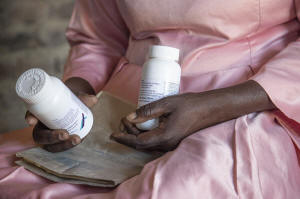PEPFAR keeps millions of people with HIV alive and may be spared from
Trump spending cuts
[July 17, 2025]
By CARA ANNA
The program known as PEPFAR is one of the most effective and popular
U.S. foreign aid projects in history, and the government says it has
saved the lives of over 25 million people around the world with HIV.
But despite years of bipartisan support, PEPFAR has faced a severe
threat as the Trump administration dismantles most U.S. foreign aid.
PEPFAR on Tuesday appeared to be spared a $400 million cut as
Republicans acted in rare defiance of a request by President Donald
Trump. But governments, health experts and people with HIV around the
world are alarmed by the effects of other U.S. aid cuts and chaos that
are already disrupting the crucial supply of HIV drugs — which are meant
to be taken daily.
Here's a look at PEPFAR and how it affects millions of people globally.
Fears of an AIDS resurgence
Today, many babies are born infection-free to mothers with HIV — the
U.S. State Department says PEPFAR has been responsible for 5.5 million
such births — and most people around the world no longer see an
infection as a death sentence.
Governments in Africa and elsewhere had even begun to worry about
complacency as people, especially youths, took the widespread
availability of HIV drugs for granted. In another significant step
forward, the U.S. Food and Drug Administration recently approved for use
the world’s only twice-a-year shot to prevent HIV.
But the abrupt U.S. aid cuts have health officials in developing
countries warning of a return to the early days of the AIDS pandemic,
when drugs were nonexistent or severely limited and clinics were filled
with the dying. PEPFAR was launched in 2004 in response to those grim
scenes.

Also known as the U.S. President’s Emergency Plan for AIDS Relief, the
program has partnered with nonprofit groups to provide HIV medication —
including the preventative PrEP — to millions around the world. It has
strengthened national health care systems, cared for children orphaned
by AIDS and provided job training for people at risk. It has played an
important role in testing for and tracking HIV infections.
HIV/AIDS has no cure, and it has killed over 40 million people globally
over the years. Now the U.N. agency on AIDS is warning that analysis
suggests 4 million additional AIDS-related deaths between now and 2029,
including 300,000 additional children’s deaths, if programs permanently
lose PEPFAR's support.
From widespread support to baseless claims
Since PEPFAR's creation by Congress and Republican President George W.
Bush, the program has largely enjoyed support across the political
spectrum — and gratitude from countries whose health systems have been
poorly equipped to care for millions with HIV.
But misinformation has crept in. The Heritage Foundation, an influential
conservative Washington think tank, accused the Biden administration of
using PEPFAR “to promote its domestic radical social agenda overseas.”
Conservatives claimed there were efforts to integrate abortion with
HIV/AIDS prevention, a claim the Biden administration denied. Similar
claims linger under the Trump administration.
[to top of second column]
|

Florence Makumene holds HIV medication that she received through
funding from the U.S. President's Emergency Plan for AIDS Relief (PEPFAR),
along with her hospital records book, at her home in Harare,
Zimbabwe, Feb. 7, 2025. (AP Photo/Aaron Ufumeli, File)
 Trump and his officials also claim
widespread waste and fraud as they seek to dismantle U.S. foreign
aid. But PEPFAR has been repeatedly scrutinized. Last year, the
government said the State Department's Office of Inspector General
had conducted 80 audits, inspections, and special reviews that
included oversight of PEPFAR programs, “including 21 thematic
reviews and audits specifically focused on PEPFAR.”
Impossible to replace US funding
The $400 million proposed cut to PEPFAR still could be restored, in
part or in full, as the bill on spending cuts faces a final vote in
the Senate, a vote in the House of Representatives and Trump's
signature before a Friday deadline.
“We must stay vigilant,” International AIDS Society President
Beatriz Grinsztejn said in a statement Wednesday after PEPFAR
appeared to be spared.
No matter what, countries and health experts say it will be
impossible to fill the funding gap left by the overall U.S.
withdrawal of billions of dollars in aid for the global HIV
response, including via PEPFAR.
Last month, a UNAIDS report said the abrupt cuts have “destabilized
supply chains, led to the closure of health facilities, left
thousands of health clinics without staff, set back prevention
programs, disrupted HIV testing efforts and forced many community
organizations to reduce or halt their HIV activities.”
South Africa, where more people live with HIV than anywhere else in
the world, has said 12 specialized HIV clinics that were funded by
the U.S. have had to close down and over 8,000 health workers in its
national HIV program are out of work.
Now health workers there and elsewhere are trying to track down an
unknown number of people who have lost access to HIV medication. The
stakes are deadly. Stopping the drugs allows the virus to start
multiplying again. HIV can rebound to detectable levels in people’s
blood in just a few weeks, putting sexual partners at risk. The
virus could even become drug-resistant.

“It has really been hectic for us,” said Mbonisiwe Hlongwane,
manager of the HIV program at the Bertha Gxowa public hospital in
Germiston, east of Johannesburg. And the uncertainty only continues.
___
Associated Press writer Mogomotsi Magome in Johannesburg contributed
reporting.
All contents © copyright 2025 Associated Press. All rights reserved |